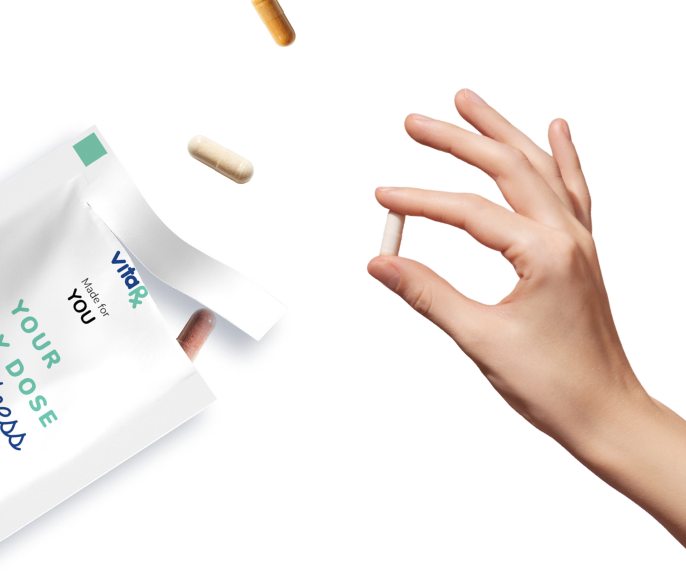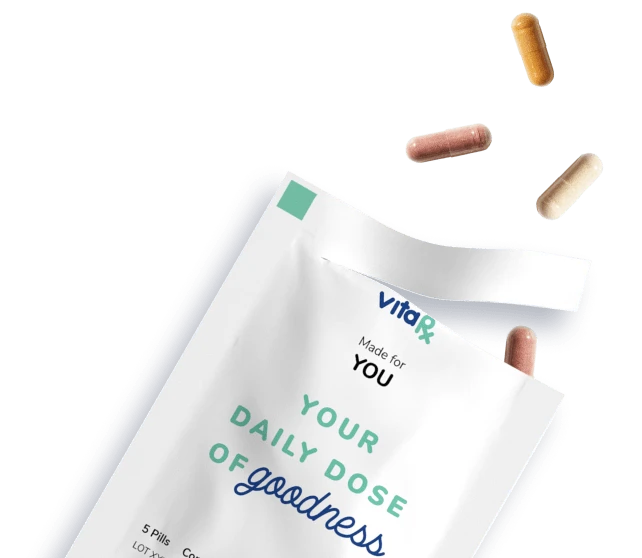Last update: January 21, 2025
12 minute read
10 Best Supplements to Manage Cortisol
Explore top 10 supplements for cortisol control. Find peace with ashwagandha, probiotics, and more.

By Stephanie Wright, RN, BSN
Edited by Dr. Jacquie Leone, NMD, HN

What if there was a way you could manage stress and its effect on your health with natural remedies? Manage your cortisol levels with our guide to the best supplements for a peaceful state of mind. You'll learn about natural adaptogens like ashwagandha, the gut-soothing power of probiotics, and other supplement options that may help you find calm. Join us as we explore how these supplements can be a part of your tranquility toolkit.
Key takeaways
- Ashwagandha and probiotics are popular supplements for managing cortisol levels
- Adding lifestyle practices like regular exercise and sleep is crucial for hormonal balance
- Re-evaluating your supplement routine with changing health needs ensures continued support for stress management
What supplements can help you control cortisol?
Cortisol is the stress hormone; it spikes high when you are experiencing high levels of stress. Cortisol levels that swing out of control can negatively affect your well-being, leading to anxious days and sleepless nights.
But don't worry, there's a range of supplements that can help you keep this stress hormone in check. Let’s walk through 10 top-tier supplements, handpicked and backed by research, that can help you achieve hormonal balance.
1. Ashwagandha
Ashwagandha is a leader in helping manage stress and keep cortisol levels in check. It's an ancient adaptogen that helps your body recover from stress, bringing a feeling of calmness.
Studies note that ashwagandha not only lowers cortisol levels but also boosts your mood, making it a star in stress management. Using ashwagandha is a great way to stay calm and positive, providing a natural and gentle approach to dealing with stress.
This natural stress reliever is a good choice for people who want a holistic option to feel better and handle life's pressures. Adding ashwagandha to your routine is like giving your body a little help in dealing with stress.
2. Probiotics
Probiotics are friendly bacteria that can help manage cortisol. When you have the right balance of these helpful microorganisms in your gut, they support a more balanced cortisol level.
This is important because too much cortisol can make you feel stressed and anxious. Probiotics work to keep your gut in good shape, and a healthy gut means better control over cortisol levels.
Including probiotics in your diet, through foods like yogurt or supplements, is an easy way to support a calm and less stressed nervous system. Taking care of your gut with probiotics is like giving your body a natural way to handle stress and keep your mind happier.
3. Prebiotics
Prebiotics can play a beneficial role in managing cortisol. By promoting the growth of good bacteria in your gut, prebiotics contribute to a healthier balance, helping regulate cortisol levels.
This is important since high cortisol levels are linked to increased stress and anxiety. Prebiotics are plant fibers that feed healthy probiotics.
Including prebiotics in your diet, found highest in foods like bananas, garlic, whole grains, cabbage, and onions, can be a simple and tasty way to support your gut health. When your gut is in good shape, it can help make sure that cortisol stays at a more balanced level.
VitaRx Tip
If you're looking for a natural and easy way to manage stress, consider adding prebiotic-rich foods or supplements into your diet for a happier gut and a calmer mind.
4. Fish oil
Fish oil is a popular supplement with omega-3 fatty acids that your body needs for different processes. Some studies suggest it can help with stress by lowering cortisol, the stress hormone, and improving your body’s ability to manage stress.
A research review noted evidence of fish oil helping to lower stress and anxiety levels. Fish oil seems to work by affecting your main stress response system in the body.
Including fish oil in your diet or as a supplement might be an easy way to support stress management and overall health. But it's important to pick high-quality fish oil, follow the recommended amount, and talk to your doctor, especially if you have health issues or take other medications or supplements.
5. Phosphatidylserine
Phosphatidylserine is like a fatty substance that protects the nerve cells in your brain and helps them talk to each other. You can get it as a supplement, and it's typically safe to use.
Research shows phosphatidylserine helps with memory, mental processing, paying attention, and staying focused. It's also supposed to help with stress, sleep, and some issues related to ADHD, depression, anxiety, and Alzheimer’s disease.
If you're feeling sore after working out a lot, phosphatidylserine might also help. It works by keeping cortisol from getting too high. Some studies show that taking phosphatidylserine can lower cortisol levels, making you feel better, less anxious, and more focused.
While it's not an FDA-approved treatment for anxiety, adding phosphatidylserine to your diet or taking it as a supplement could be a simple way to help manage stress and stay healthy. But before trying any new supplement, it's a good idea to talk to your doctor, especially if you have other health conditions or take other medications or supplements.
6. Magnesium
Magnesium is a mineral involved in over 600 biological processes in your body, like helping control cortisol. When you face something stressful, your body goes into a "fight-or-flight" mode, releasing hormones like adrenaline and cortisol to prepare you for action. But if you're always stressed, too much cortisol can lead to anxiety, tiredness, and feeling down.
Magnesium steps in to help calm your nervous system and control hormone production. It lowers cortisol levels, fights fatigue, and even supports thyroid problems.
Magnesium is crucial for your nervous system to work properly and send messages throughout your body. If you don't have enough magnesium, it can make you feel really anxious or even sad. Taking a magnesium supplement might help reduce these feelings and keep your brain working well.
7. Vitamin C
Vitamin C is a nutrient that’s essential for the growth and repair of tissues in your body. It can also help manage cortisol.
Studies have shown that taking vitamin C supplements can reduce cortisol levels and improve the body’s response to stress. For example, a study of trauma patients showed great benefit in taking vitamin C to help reduce their body’s stress response.
Another study shows taking vitamin C is an effective form of support for anxiety and depression. Vitamin C may work by reducing inflammation, a common cause of stress and cortisol release. Vitamin C is found in many fruits and vegetables, like oranges, strawberries, kiwi, broccoli, and bell peppers.
VitaRx Tip
Adding vitamin C-rich foods to your diet or taking vitamin C supplements may be a simple and effective way to support your stress management and overall health.
8. L-theanine
L-theanine is a special amino acid found in green and loose-leaf tea, with some health benefits. Taking L-theanine supplements can boost levels of GABA, dopamine, and serotonin, helping you relax and lower anxiety.
It also helps reduce cortisol, fights fatigue, and has anti-inflammatory properties to support thyroid issues. You can get L-theanine by sipping certain teas like green, white, or matcha, or take it in tablet or pill form.
Some studies suggest L-theanine can make you feel more awake, while others say it may help with sleep. It's good at lowering corticosterone, a stress hormone, which can improve memory and learning.
L-theanine seems to work by affecting the body's main stress response system, the hypothalamic-pituitary-adrenal (HPA) axis. So, adding L-theanine-rich foods to your diet or taking L-theanine supplements might be an easy way to support stress management and overall health.
9. B vitamins
B vitamins are crucial nutrients found in different foods, but sometimes your body needs more, especially due to factors like age, pregnancy, diet, or health conditions. B-complex vitamins, which have all 8 B vitamins, can help with stress by keeping your nerves and brain in check.
Foods like green veggies, avocados, fish, bananas, and chicken are rich in these vitamins and can also help reduce stress. Two B vitamins, B5 and B6, are great for fighting stress.
B5 helps control the stress hormone cortisol, especially during tough times, while B6 is busy making things your body needs, like neurotransmitters. You can find B6 in foods like chickpeas, salmon, and potatoes. Taking B-complex supplements might help with stress, boost your brain, and make you feel less sad or worried.
10. Rhodiola
Rhodiola is a herb that people have used for a long time in different parts of the world, known for helping with cortisol by lowering its levels and making your body handle stress better. Rhodiola does this by balancing hormones, especially cortisol.
This is because it has a phytochemical called Salidroside, which balances cortisol, helps with anxiety, and fights aging. Using Rhodiola may boost your mood, reduce tiredness, and improve how well you think.
It might also help with feelings of sadness by affecting mood-related chemicals in your brain, like serotonin and dopamine. Rhodiola might even make your brain work better, improving memory, attention, and mental performance.
It's also good for fighting mental and physical tiredness, helping you stay alert and less exhausted, which improves overall mental energy and resilience. Adding Rhodiola to your diet or taking it as a supplement could be a holistic way to support stress management and overall health.
Dos and don’ts for managing cortisol levels
Let’s dive into some key dos and don'ts for managing cortisol levels effectively.
Do’s
Get proper sleep.
Stay hydrated throughout the day.
Practice mindfulness or meditation.
Enjoy leisure activities regularly.
Keep social connections.
Don’ts
Rely solely on supplements for stress management.
Over-exercise, which can increase cortisol levels.
Consume excess caffeine, especially late in the day.
Neglect the importance of a balanced diet.
Ignore persistent high-stress levels without getting help.
More cortisol management tips
Beyond supplements, there are plenty of strategies to help manage cortisol levels effectively. Combining these practices into your daily routine can lead to improved stress management and overall well-being.
- Exercise regularly but don't overdo it, as intense activity can spike cortisol.
- Add relaxation techniques like meditation, yoga, or deep breathing exercises.
- Encourage a consistent sleep schedule to keep a healthy circadian rhythm.
- Focus on a balanced diet that covers plenty of fruits, vegetables, lean proteins, and whole grains.
- Reduce caffeine and sugar intake to avoid cortisol spikes.
- Engage in social activities and seek strong support networks to help reduce stress.
- Consider counseling or therapy for chronic stress or if you're struggling to manage stress on your own.
Advantages and disadvantages of managing cortisol levels
Effectively managing cortisol levels can really benefit your health, but it's important to approach it with caution and make an informed decision. Let's weigh the pros against the cons.
Frequently asked questions (FAQ)
Here are some of the most frequently asked questions about managing cortisol.
Final thoughts
Dealing with cortisol doesn't need to be complicated. The right supplements, like ashwagandha and Rhodiola, combined with healthy lifestyle choices and advice from health pros, can help you find a better balance and boost your well-being.
Your stress management journey is unique, with some trial and error and plenty of self-care. Take it step by step, and be kind to yourself on the way.
Sources and references
- Physiology, Cortisol - StatPearls - NCBI Bookshelf
- Ashwagandha: Is it helpful for stress, anxiety, or sleep? - Health Professional Fact Sheet
- Efficacy of probiotics on stress in healthy volunteers: A systematic review and meta‐analysis based on randomized controlled trials
- Effect of prebiotic and probiotic supplementation on circulating pro-inflammatory cytokines and urinary cortisol levels in patients with major depressive disorder: A double-blind, placebo-controlled randomized clinical trial - ScienceDirect
- Omega-3 Supplementation and Stress Reactivity of Cellular Aging Biomarkers: An Ancillary Substudy of a Randomized, Controlled Trial in Midlife Adults
- The effect of phosphatidylserine supplementation on athletic performance: A systematic review of randomized clinical trials
- Magnesium Status and Stress: The Vicious Circle Concept Revisited
- Vitamin C: an essential “stress hormone” during sepsis - PMC
- The role of vitamin C in stress-related disorders - ScienceDirect
- Effects of L-Theanine Administration on Stress-Related Symptoms and Cognitive Functions in Healthy Adults: A Randomized Controlled Trial - PMC
- Full article: A combination of green tea, rhodiola, magnesium and B vitamins modulates brain activity and protects against the effects of induced social stress in healthy volunteers
- Assessing brain function in stressed healthy individuals following the use of a combination of green tea, Rhodiola, magnesium, and B vitamins: an fMRI study - PMC
Author

Stephanie Wright
Stephanie brings over 13 years of diverse nursing experience to the table, having honed her expertise in critical care, mental health, and utilization management. Her journey as a registered nurse across these various healthcare sectors underscores her adaptability and deep commitment to patient care.
Fact checker

Dr. Jacquie Leone
Dr. Leone holds a BA in Psychology, a Doctorate in Naturopathic Medicine, and board certification in holistic nutrition. In addition to practicing medicine, Dr. Leone has developed and currently teaches science and nutrition courses for a nationally accredited institution. She specializes in chronic illness, gastrointestinal dysregulation, inflammatory conditions, and mental health. Her unique approach combines the wisdom of Eastern medicine with the technology and science of Western medicine, offering an integrative approach heavily focused on functional medicine.
At VitaRx, we're not just passionate about our work — we take immense pride in it. Our dedicated team of writers diligently follows strict editorial standards, ensuring that every piece of content we publish is accurate, current, and highly valuable. We don't just strive for quality; we aim for excellence.
Related posts
While you're at it, here are some other relevant articles you might be interested in.

Get your personalized vitamin recommendations in less than
5 minutes.
Get your personalized vitamin recommendations in less than
5 minutes.









